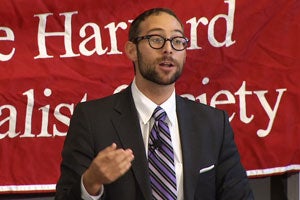On Feb. 1, the HLS Federalist Society sponsored a debate on the philosophical and legal issues surrounding the field of embryonic research.
The event, “Embryo Ethics and the Law,” featured Christopher Tollefsen, a philosophy professor at the University of South Carolina, and HLS Assistant Professor Glenn Cohen, co-director of the Petrie-Flom Center for Health Law Policy, Biotechnology, and Bioethics at Harvard Law School.
Tollefsen (below), the author of several books including “Embryo: A Defense of Human Life,“ explored the professionalization of science and the stake that the state holds in research. He began the debate with the question of the regulation and governance of science, questioning whether research should be governed by scientific principles, or should be based in the morals and ethics of society.
Cohen, who specializes in bioethics and health law, said embryonic cell research was not based in liberalism, but could be adopted by conservatives, libertarians, pro-life and pro-choice alike. He argued for the maximum possibility of liberty as long as no harm was done to others.
The question of whether embryonic research falls into the harm principle, said Cohen, cannot be answered through religious principles, as it is unethical to base state-made decisions in any one religious belief. He offered five sets of philosophy that explore the question of human conception, including the 14-day theory and the idea that humans are beings with full legal rights at conception.
The question of when zygotes become human beings and what legal protection this provides played heavily in the debate. “Human persons are to be morally immune from unprovoked violence, so it’s wrong, everywhere and always, to kill an innocent human being,” Tollefsen stated. “I think that this norm is violated in embryo destructive research, research in which human beings, at their earliest stages of development, are killed as part of the project of obtaining new knowledge.”
